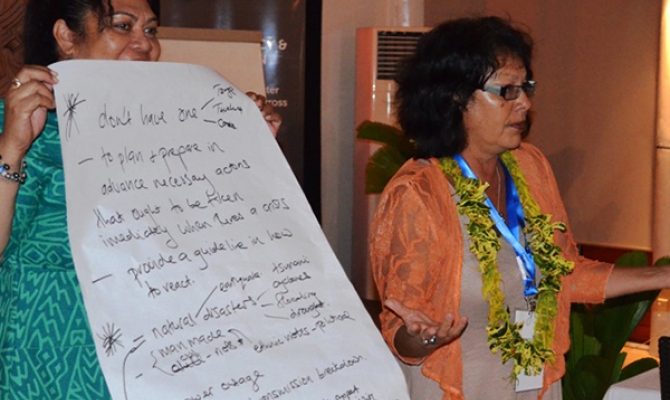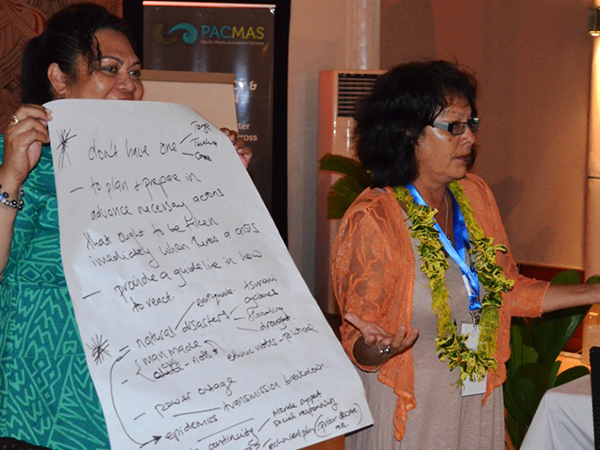
Climate Change Resilience
National broadcast stations of eight Pacific island countries will have Climate and Disaster Resilience Plans developed by April 2015.
A new project will help broadcast stations strengthen their ability to provide quality and timely information without fail. This timely communication will enable communities to prepare and respond to natural disasters, and to ensure that stations are well prepared and equipped to continue broadcast coverage during times of emergencies, while ensuring that staff remains safe.
The "National Broadcasting Climate and Disaster Resilience Plan" Project is an initiative funded by PACMAS, the Pacific Media Assistance Scheme and implemented by the Secretariat of the Pacific Regional Environment Programme (SPREP) in partnership with the Secretariat of the Pacific Community (SPC).
"We have had requests from national broadcasters for support in this area and are pleased to announce that the wheels are in motion for this," said Mr. Francis Herman, Programme Manager of PACMAS.
"Since 2012, national broadcasters of the region have agreed upon the need for an emergency system and for further information on climate change and how they link. We are looking forward to the outcomes of this project."
Selected by PACMAS, eight national broadcasters from the Cook Islands, Palau and Marshall Islands, Kiribati, Samoa, Solomon Islands, Tonga, Tuvalu and Vanuatu are to be part of this project and will see climate and disaster resilience plans developed. They will receive training on the plan and Standard Operating Procedures will be developed between the broadcaster and national disaster management office, as well as training for their news teams on disaster management and climate change.

Dr. Netatua Pelesikoti, Director of Climate Change at SPREP stated, "Our Pacific broadcasters' play a crucial role in times of emergencies and this partnership between us all will help strengthen that role. The Climate and Disaster Resilience Plan for broadcasters is addressing two key issues in one plan, it is pioneering for our region and follows on from the regional joint Climate Change and Disaster Risk Management Framework now in development. We are very excited by this project."
Mosese Sikivou, Deputy Director, Disaster Reduction Programme at SPC agrees. "This project provides a great opportunity to strengthen the role of national broadcasters in an emergency, while consolidating their relationship with their National Disaster Management Office. SPC are delighted to be working in close partnership with SPREP on this project which brings together the respective strengths of both organisations to contribute to increased resilience in the Pacific."
If successful, it is hoped that these activities can be extended to reach other Pacific island countries as well.
For more information please contact:
PACMAS: Mr. Wilson Toa, Research Officer, [email protected]
SPREP: Ms. Nanette Woonton, Media and Public Relations Officer, [email protected]
SPC: Dr Kirstie Méheux, Senior Adviser, Disaster Risk Management Training and Professional Development, [email protected]
A new project will help broadcast stations strengthen their ability to provide quality and timely information without fail. This timely communication will enable communities to prepare and respond to natural disasters, and to ensure that stations are well prepared and equipped to continue broadcast coverage during times of emergencies, while ensuring that staff remains safe.
The "National Broadcasting Climate and Disaster Resilience Plan" Project is an initiative funded by PACMAS, the Pacific Media Assistance Scheme and implemented by the Secretariat of the Pacific Regional Environment Programme (SPREP) in partnership with the Secretariat of the Pacific Community (SPC).
"We have had requests from national broadcasters for support in this area and are pleased to announce that the wheels are in motion for this," said Mr. Francis Herman, Programme Manager of PACMAS.
"Since 2012, national broadcasters of the region have agreed upon the need for an emergency system and for further information on climate change and how they link. We are looking forward to the outcomes of this project."
Selected by PACMAS, eight national broadcasters from the Cook Islands, Palau and Marshall Islands, Kiribati, Samoa, Solomon Islands, Tonga, Tuvalu and Vanuatu are to be part of this project and will see climate and disaster resilience plans developed. They will receive training on the plan and Standard Operating Procedures will be developed between the broadcaster and national disaster management office, as well as training for their news teams on disaster management and climate change.

Above: Pacific Broadcasters Emergency Plans Training, 2012
Dr. Netatua Pelesikoti, Director of Climate Change at SPREP stated, "Our Pacific broadcasters' play a crucial role in times of emergencies and this partnership between us all will help strengthen that role. The Climate and Disaster Resilience Plan for broadcasters is addressing two key issues in one plan, it is pioneering for our region and follows on from the regional joint Climate Change and Disaster Risk Management Framework now in development. We are very excited by this project."
Mosese Sikivou, Deputy Director, Disaster Reduction Programme at SPC agrees. "This project provides a great opportunity to strengthen the role of national broadcasters in an emergency, while consolidating their relationship with their National Disaster Management Office. SPC are delighted to be working in close partnership with SPREP on this project which brings together the respective strengths of both organisations to contribute to increased resilience in the Pacific."
If successful, it is hoped that these activities can be extended to reach other Pacific island countries as well.
For more information please contact:
PACMAS: Mr. Wilson Toa, Research Officer, [email protected]
SPREP: Ms. Nanette Woonton, Media and Public Relations Officer, [email protected]
SPC: Dr Kirstie Méheux, Senior Adviser, Disaster Risk Management Training and Professional Development, [email protected]